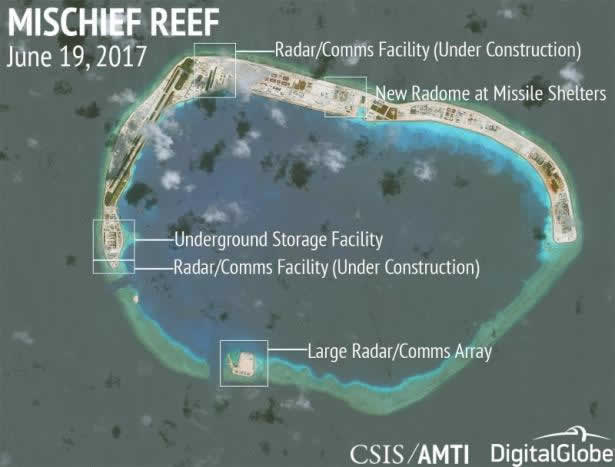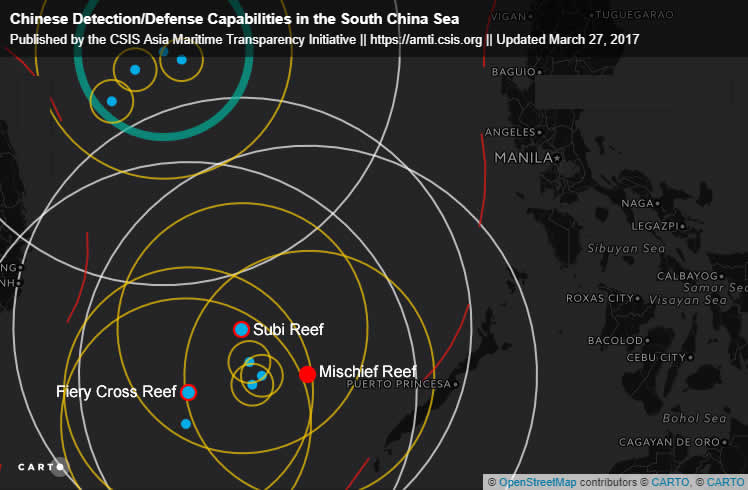|

Construction is shown on Panganiban Reef (Mischief Reef) in this June
19, 2017 satellite image released by CSIS Asia Maritime Transparency
Initiative at the Center for Strategic and International Studies to
Reuters. (CSIS/AMTI DigitalGlobe/Handout/Reuters)
 ccording
to the Asia Maritime Transparency Initiative (AMTI), a Washington-based
think tank, and a part of the Center for Strategic and International
Studies (CSIS), China has upgraded its facilities in Panganiban Reef
(Mischief Reef), Fiery Cross Reef, and Subi Reef. According to the June
19, 2017 AMTI report, China is continually “expanding its already
substantial communications and radar capabilities on the artificial
islands. A very large antennae array is being installed on a small
outpost at the southern side of Mischief Reef, presumably boosting
China’s ability to monitor activity around the feature. That ability
should be of particular concern to Manila, given Mischief’s proximity to
Palawan, Reed Bank, and Second Thomas Shoal.” ccording
to the Asia Maritime Transparency Initiative (AMTI), a Washington-based
think tank, and a part of the Center for Strategic and International
Studies (CSIS), China has upgraded its facilities in Panganiban Reef
(Mischief Reef), Fiery Cross Reef, and Subi Reef. According to the June
19, 2017 AMTI report, China is continually “expanding its already
substantial communications and radar capabilities on the artificial
islands. A very large antennae array is being installed on a small
outpost at the southern side of Mischief Reef, presumably boosting
China’s ability to monitor activity around the feature. That ability
should be of particular concern to Manila, given Mischief’s proximity to
Palawan, Reed Bank, and Second Thomas Shoal.”
China appears at present to be
concentrating on three artificial islands: Fiery Cross Reef, Subi Reef,
and Panganiban Reef. The three reefs’ strategic locations give China
control of nearly the entire South China Sea. “In February, AMTI
identified eight hardened shelters with retractable roofs at each of the
Big Three, which Reuters had earlier reported would house missile
launchers.” An additional four are being built at Fiery Cross, with
Panganiban and Subi likely to follow.
What should be more disturbing to the
Philippines is that in addition to powerful radar arrays, Panganiban
Reef, like Fiery Cross and Subi, has a newly-built runway from which
China can launch a wide variety of military aircraft. Chinese jet
fighters launched from Panganiban Reef will be able to control the skies
well beyond the entire island of Palawan.

China’s
reach from the Panganiban (Mischief), Subi, and Fiery Cross reefs.
Yellow circles show radar coverage, larger white circles show fighter
aircraft coverage. (CSIS/OpenStreetMap/Carto)
An earlier AMTI report noted: “On Mischief
Reef, the hangars for 24 combat aircraft have been completed and in
early March construction teams were putting the finishing touches on
five larger hangars. A finished radar tower stands in the middle of the
reef and a trio of large towers have been constructed on the
southwestern corner. The recent placement of a radome on the ground next
to one of these towers indicates that they will follow the same pattern
as the identical sets at Fiery Cross and Subi. Retractable roofs are
also being installed on the recently-built missile shelters.”
At the end of its latest report AMTI notes:
“Finally, construction is underway on very large underground
structures—four at each reef—that seem likely candidates to house
munitions or other essential materiel. Large buried facilities have
previously been built on each of the islands for fuel and water storage,
according to a recent Pentagon report.”
It is certainly worth stating at this point
that Panganiban Reef, as far as the UN tribunal ruling is concerned,
belongs solely to the Philippines. It lies within the country’s 200-mile
Exclusive Economic Zone (EEZ). Philippine President Rodrigo Duterte has
already wasted enough time trying to appease China and its President Xi
Jinping, to no avail. The longer we delay, the more powerful and
entrenched China will be.
Duterte is right in now seeking America’s
help after being personally threatened by Xi with war. But given China’s
current strength, even the United States cannot take on China alone. As
we pointed out in previous editorials, the Philippines must be at the
forefront of forming a global coalition of nations that will unite and
stand up to China. As a signatory to the United Nations Convention on
the Law of the Sea (UNCLOS), China has to abide by the UN tribunal’s
2016 ruling. Published 7/4/2017 |